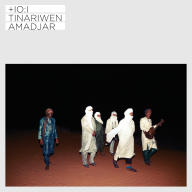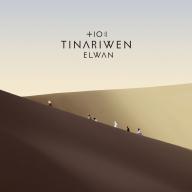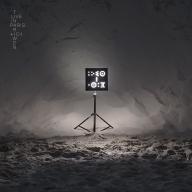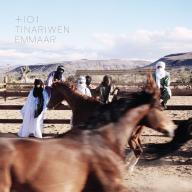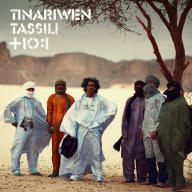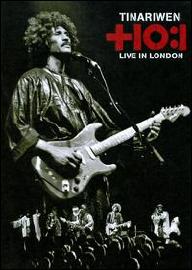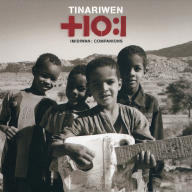Formed in 1979 by Ibrahim Ag Alhabib, a Malian refugee, Tinariwen coalesced in the early '80s in the Libyan rebel camps of Colonel Gaddafi, as each of the musicians had been forced from their nomadic lifestyle into involuntary military service. Surrounded by a displaced nation of their peers, the band forged a new style of music, trading their traditional lutes and shepherd's flutes for electric guitars and drums. The style that resulted was dubbed "Tishoumaren," or "the music of the unemployed." Their music addresses issues such as political awakening, problems of exile, repression of their people, and demands of sovereignty.
In a region with no postal or telephone system, Tinariwen's tapes soon became a grassroots voice of rebellion and a rallying point for the disenfranchised nation. Though outlawed in Algeria and Mali, 2001's The Radio Tisdas Sessions and 2004's Amassakoul were available to Western audiences. In 2006, they recorded their third album, Aman Iman: Water Is Life, released internationally in 2007 by Harmonia Mundi's World Village imprint. The album was produced by Justin Adams and featured the voice and guitar of founding member Mohammed Ag Itlale. In its wake, Tinariwen toured the world for the first time. They followed the album with Imidiwan: Companions, a two-disc set containing one disc of music and a DVD documentary about the band's history. This was once again followed by a world tour that included numerous festival appearances in the United States and Europe.
Tinariwen signed to America's Anti- imprint in 2010. The label encouraged them to experiment. The end result was Tassili, issued in 2011, in which the band recorded a completely acoustic set in a protected region of the southeastern Algerian desert. The tapes were flown to America, where guitarist Nels Cline overdubbed electric guitars and New Orleans' famed Dirty Dozen Brass Band added horns, making Tassili a truly international collaboration. The album won a Grammy. The bandmembers were forced to flee Mali due to political and social unrest, and they recorded their follow-up, Emmaar, at a studio in Joshua Tree National Park in the United States; it was released in February 2014. Despite ongoing political upheaval, Tinariwen reconvened in 2016 after touring behind Emmaar to record their sixth studio album, Elwan.
Following a world tour in support of Elwan and an appearance at the 2018 Taragalte Festival of nomadic cultures in Morocco, Tinariwen set out on a journey to Nouakchott, Mauritania, where they would join singer Noura Mint Seymali and her husband, guitarist Jeiche Ould Chighaly, to create their new album. Written during the journey and recorded live without overdubs in a tent in the desert, 2019's Amadjar featured instrumental contributions added later by a diverse array of Western collaborators including Warren Ellis, Micah Nelson, Stephen O'Malley, Rodolphe Burger, and Cass McCombs.
An archival album, Kel Tinariwen, arrived in November 2022 and featured the group's 1991 collaboration with Sonhrai and Tuareg painter, poet, and songwriter Keltoum Sennhauser. Originally intended as their first official recording, Kel Tinariwen had gone largely unheard since its initial cassette-only release. ~ Evan C. Gutierrez & Thom Jurek, Rovi


